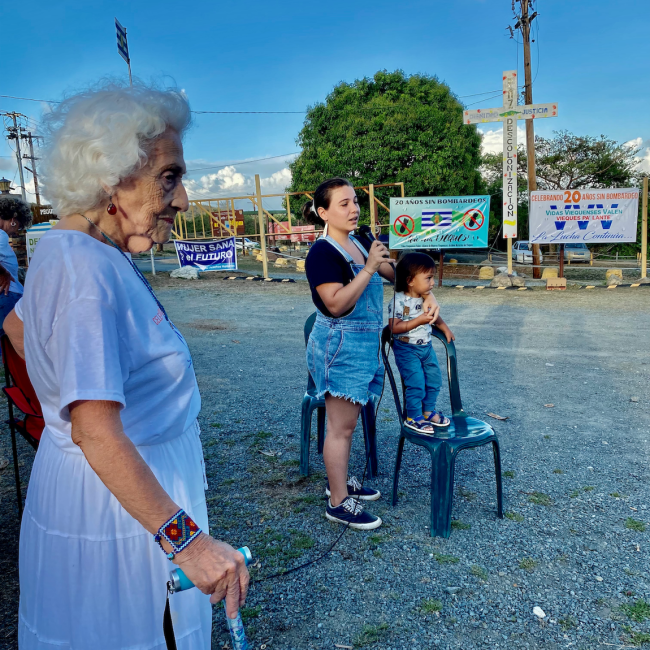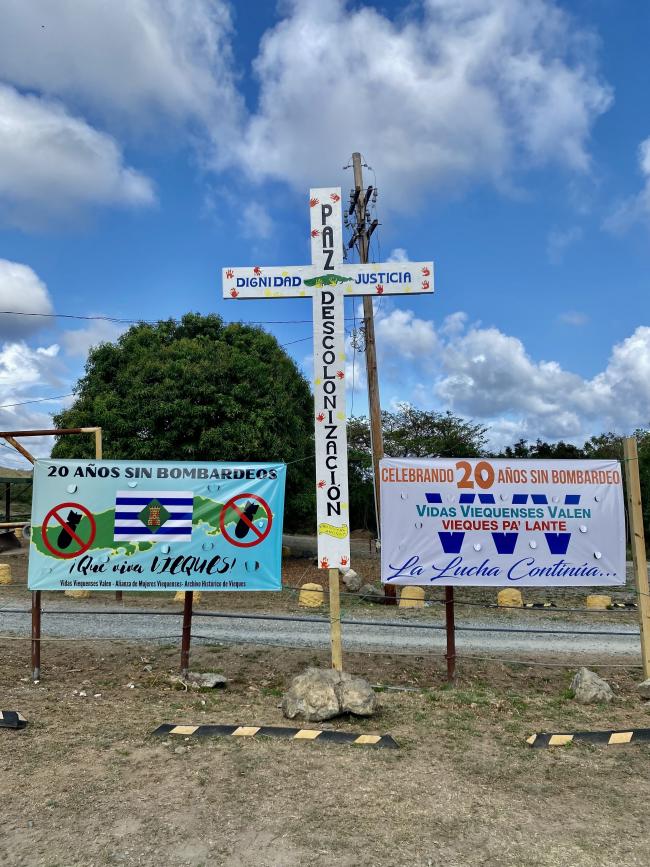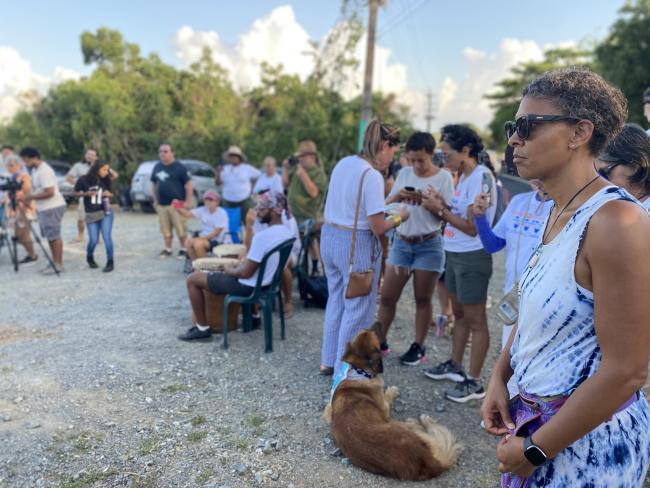
This piece appeared in the Winter 2023 issue of NACLA's quarterly print magazine, the NACLA Report. Subscribe in print today!
In 2003, the Puerto Rican island of Vieques won an important victory. After years of citizen-led struggle, the United States Navy ceased using the territory as a testing range for military activities, a practice it employed for more than six decades. Twenty years after the end of the bombings, many debts to the residents of Vieques remain regarding outstanding needs to restore the environment, end lasting violence, and ensure respect for the human rights of the community.
Myrna Pagán is an octogenarian leader who participated in the movement for demilitarization and has lived for decades in the Esperanza neighborhood, on the south side of Vieques. Today, she has children and grandchildren on the island.
Pagán is the daughter of Puerto Rican parents from Juncos and Rio Grande. They met in New York, and her life revolved around visits to Puerto Rico and returns to New York. “I was born in Puerto Rico, in San Juan,” she says. “Before I was two years old, my parents had returned to New York, where I grew up and where I studied until college. I left the city of New York to go to a couple of women’s universities.”
Pagán had an interest in literature and theater. “I studied fine arts, that’s when I started to grow, I think … and I entered a very interesting time in my life when I started to travel to South America, and part of that was always singing or in theater,” she recalls. “Then I visited Vieques for the first time.” A friend “who had trained for the Korean War here in Vieques fell in love with the island,” she remembers. “He quit the Marines and returned to Puerto Rico, and he settled in Vieques.” She then decided to live on the island.
Now, Pagán’s community is among the most heavily impacted by gentrification. I spoke with her in Esperanza in July 2023. In our interview, she talks about her trajectory in the resistance against militarization and the challenges Vieques faces today. Our conversation has been edited for length and clarity.
Diana Ramos: When did you decide to live in Vieques?
Myrna Pagán: I lived in Spain for a while, then I moved to Morocco. Morocco prepared me for Vieques. I arrived, not knowing anything about the history of Vieques.
I started my activism establishing the Vieques Conservation and Historical Trust, working to preserve the natural resources of Vieques. I was the first president, and I was there for several years. But there I was not allowed to speak against the destruction of nature in Vieques by the Navy.
So I found that I had to leave the Trust. By that time my husband Charlie Connelly had a newspaper called The Vieques Times, which we edited, published, delivered—we did everything. Mostly, the purpose of the newspaper was to wake up the community to the destruction that they already lived and felt. People were sick, but there was no protest. There was already a movement with the help of the people of the big island, a movement against the activities of the Navy, starting with Culebra, our sister island. The fishermen were at the forefront of the demands then.

DR: How do you remember those days of the military presence in Vieques?
MP: Looking back, I can recall my first reaction to going to an activity in the plaza. I saw representatives of the Navy in full uniform leading some holiday—maybe it was the 4th of July.
I don’t know, but the feeling of being in a theater of colonialism was very disturbing and interesting. We saw people from the community singing the national anthem and saluting the flag of the United States.
It was something that was not seen anywhere else in Puerto Rico. Vieques has always been the colony of the colony, which is Puerto Rico. For so long, saying that Puerto Rico is a colony was not acceptable. Until reality sinks in.
Today, we have a situation where Puerto Rico is totally run by a “Junta” (Fiscal Control Board), which was placed in power by the U.S. government in cahoots with the government of Puerto Rico. They are running the country. How can you any longer deny that this is a colony? Well, you cannot. The U.S. control particularly over our development is blatant.
DR: What is happening in Vieques now, 20 years after the end of the bombings by the Navy?
MP: I’m thinking about the economic development of the island at this time, now that agriculture has been more or less buried or put to rest in favor of tourism. Today I believe that practically everything that’s happening on this island is oriented toward making a paradise for the rich. There is continued suffering and abuse under colonial status. And fortunately—and I say this with all my heart—fortunately, there is a new generation of young Viequenses working hand in hand with the older generation, who are passing on wisdom, practice, and experience to the new generation.
This new generation is out there to protect their island in the face of gentrification, the lack of medical services, and the lack of a functioning ferry service, which is our link, our highway to Puerto Rico, the big island. This ferry is undependable and affects just about every aspect of our lives.
So, here we are with paradise having shifted over into other hands. And the struggle is growing because of the alertness and awakeness of this new generation, working hand in hand with the former generation, of which I am part.
I’m still alive, I’m still kicking, and I’m still protesting. And I take great pride in the activism of my grandchildren who are devoted to our community. This all adds up to having lived a very beautiful life and feeling useful, feeling passionate, and feeling totally involved still with my community and doing what I can to protect our rights and to help develop beyond the heavy hand and control of the colonial situation and the ever-present military occupation.

We are now celebrating 20 years without bombing on this island and our population is diminishing. The gentrification of Vieques has brought neo-carpetbaggers who arrive with money in a poverty-stricken community, because of the practically total lack of economic opportunities. They buy one, two, three houses and convert them into Airbnbs. It creates another problem for the local population: they can no longer afford to buy property in Vieques.
The deluge of real estate dealers and the high cost created by “flipping” properties—and every flip means another rise in cost—means our population is diminishing.
One of the main issues—or maybe the main issue—is an aging population that depends on medical services and accessibility. And it’s practically a no-no right now, going back to the most recent great tragedy on the island: Huracán María. That was more than five years ago, and we still have no hospital on the island. What exists is an emergency diagnostic center. If you need an x-ray, a transfusion, or a specialist, you have got to go to the big island to seek medical help.
I believe that’s one of the major reasons for the population leaving and that it is directly related to the military presence—the six decades of bombing that took place on the island and the contamination of the land. Studies are now being conducted by the Environmental Protection Agency to determine how the land, sea, and air of Vieques are contaminated. These studies should have taken place 17 years ago, to put it mildly, but no. They came, they bombed, they destroyed.
Cleanup is taking place on what has been declared as a superfund site in Vieques. This cleanup is still in its early stages. The restoration of the lands will hopefully satisfy one of the demands of this community, which is the return of our lands to the community of Puerto Rico, to Vieques.
We’ve gone backwards. Many people will describe it as genocide. It’s a word that is so strong that it brings tears to my eyes. But I’m seeing that if our population continues to dwindle, and the military is still here, and hospital services are lacking, what else can you call it? It’s a strong word and a pretty terrible situation.
Read the rest of this article, available open access for a limited time.
Diana Ramos-Gutiérrez is a journalist and audiovisual producer based in Vieques, Puerto Rico. She serves as cultural agent for the Vieques Historical Archive and is the director of the Vieques Film and Human Rights Festival (FCDHV).

